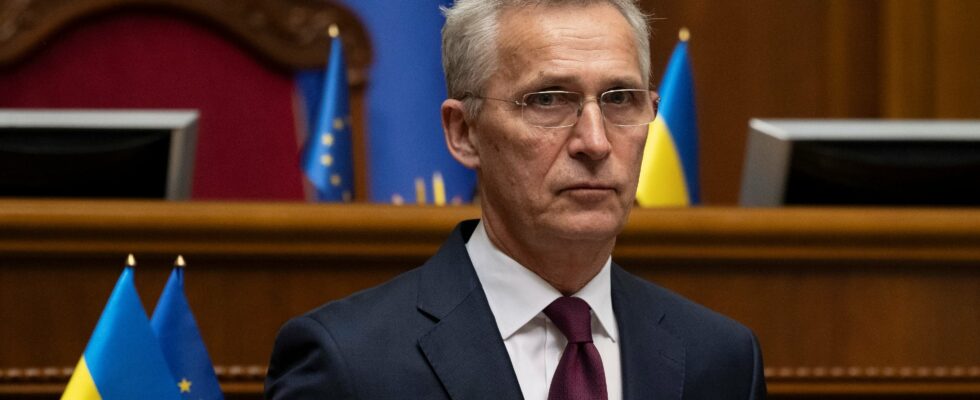Between Ukraine and Russia, fighting continues on both sides of the border. At least seven people were killed on Friday in Russian strikes on Kharkiv, Ukraine, and five in Ukrainian bombings on Belgorod, Russia, according to local authorities, who also reported dozens of wounded. While Ukrainian President Volodymyr Zelensky announced the dismissal of his air force commander, NATO Secretary General Jens Stoltenberg said he approved the Ukrainian offensive in the Russian region of Kursk.
Key information to remember
⇒ NATO Secretary General approves Ukrainian offensive in Russia
⇒ Russian mercenaries leave Burkina to reinforce the Kursk front
⇒ Volodymyr Zelensky dismisses his air force commander
NATO: Jens Stoltenberg approves Ukrainian offensive in Russia
NATO Secretary General Jens Stoltenberg said he approved of Ukraine’s offensive in Russia’s Kursk region, citing Ukraine’s right to defend itself, in an interview with the German newspaper The world“Russian soldiers, tanks and military bases are legitimate targets under international law,” the leader of the Atlantic Alliance justified.
The right of self-defense of Ukraine, invaded by Russia more than 900 days ago, “does not stop at the border”, believes Jens Stoltenberg. Launched to general surprise in August, this counter-offensive “was not planned with NATO, and the Alliance played no role”. But the organization will continue to support Ukraine with deliveries of weapons and equipment, “vital” to thwart the Russian invasion. Jens Stoltenberg also welcomed “Germany’s clear commitment to remain Ukraine’s first military donor in Europe and the second worldwide”.
Russia: Chechen soldier promoted to chief commentator of Kursk offensive
Wearing a military helmet or a beret, Chechen commander Apti Alaoudinov is a familiar face to Russians on social media, where he provides always positive news about the fighting against the Ukrainian incursion in the Kursk region. Unable to repel Ukrainian troops three weeks after the start of an operation that caught them off guard, the Russian army’s top brass prefers to remain silent. Apti Alaoudinov, 50, fills this void by regularly posting videos that appear to have been filmed near the front. With around 275,000 subscribers on Telegram, he is far from being an internet star. But his interventions are picked up by Russian media, particularly television.
Apti Alaudinov is the head of the Akhmat special forces unit, made up of Chechen fighters, many of whom were sent to Ukraine by the leader of the Russian republic in the Caucasus, Ramzan Kadyrov. With his military status, he has sought to reassure Russians by maintaining that “the enemy is almost stopped” or that the situation is “stabilising”, while the Ukrainians continue to advance. He also recently said that the war in Ukraine would end within two to three months.
Such a media presence must have received the approval of the highest authorities, experts judge to AFP. “I am convinced that this is driven by the Kremlin,” says Sarah Oates, a specialist in Russian propaganda at the American University of Maryland. Georgy Bovt, a political analyst based in Moscow, notes that “so far, it clearly suits the leaders.”
Russian mercenaries leave Burkina to reinforce the Kursk front
Russian mercenaries who recently settled in Burkina Faso have left the West African country to defend the Russian city of Kursk, which is being harassed by Ukrainian forces, their boss told AFP. In an interview on the Telegram messaging service, Viktor Yermolaev, commander of the Bear brigade, confirmed the daily’s report on Friday. The World according to which some of its troops had returned to fight in Russia.
“We saw that (the Ukrainians) had chosen war,” explained the man who calls himself “Jedi.” “War is our job […]. There is no greater honour for a Russian fighter than to defend the motherland.” According to various estimates, confirmed to AFP by a Western security source, around a hundred mercenaries have left Burkina out of some 300 men, a figure confirmed by “Jedi”. They are notably responsible for ensuring the security of the country’s strongman, Captain Ibrahim Traoré. “Some of course stay, we have bases and properties, equipment and ammunition. We don’t bring everything back to Russia,” Viktor Yermolaev said.
Volodymyr Zelensky dismisses his air force commander
Ukrainian President Volodymyr Zelensky announced on Friday the dismissal of Air Force Commander Mykola Oleshchuk, a day after news broke that a US-designed F-16 jet delivered to Kiev had crashed. “I have decided to replace the commander of the Air Force of the Armed Forces of Ukraine,” he said on Telegram, after a decree to that effect was published on the presidential website.
While the Ukrainian president did not explain the reasons for this decision, it comes the day after the announcement of the crash of an F-16 plane, a precious military equipment recently delivered by the West and which Kiev had been relentlessly demanding for two years. According to the Ukrainian army, this crash – in which the pilot Oleksiï Mes, trained in the United States, was killed – took place during a massive attack by Russian missiles and drones carried out on Monday. Little information has been provided on this episode by the Ukrainian authorities.
